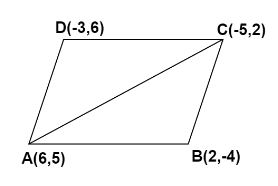Question
Question: What is the area and perimeter of quadrilateral \[ABCD\] with vertices \[A\left( {6,5} \right),{\tex...
What is the area and perimeter of quadrilateral ABCD with vertices A(6,5), B(2,−4), C(−5,2) and D(−3,6) ?
Solution
In this question, first we will draw a quadrilateral ABCD and then divide the quadrilateral in two triangles (using either of the diagonals). After that we will find the length of the sides of the triangle using distance formula i.e., d=(x2−x1)2+(y2−y1)2 . After that we will find the area of both the triangles using the formula s(s−a)(s−b)(s−c) where s=2a+b+c and a,b,c are the sides of the triangle. Then we will find the area of the quadrilateral by adding the area of the two triangles. We will finally find the perimeter of the given quadrilateral by finding the sum of all its sides.
Complete step by step answer:
Let the vertices of the quadrilateral be A(6,5), B(2,−4), C(−5,2) and D(−3,6). Let AC be the diagonal of quadrilateral ABCD

In the above figure, ABCD has been divided into △ABC and △ADC. Now let us find the length of their sides,
Using formula d=(x2−x1)2+(y2−y1)2
Therefore, AB=(2−6)2+(−4−5)2
⇒AB=16+81=97=9.85
Similarly,
BC=(2+5)2+(−4−2)2
⇒BC=49+36=85=9.2
Similarly,
AC=(−5−6)2+(2−5)2
⇒AC=121+9=130=11.4
Similarly,
AD=(−3−6)2+(6−5)2
⇒AD=81+1=82=9.05
And
CD=(−3+5)2+(6−2)2
⇒CD=4+16=20=4.47
Now we know that
Area of triangle =
s(s−a)(s−b)(s−c) where s=2a+b+c and a,b,c are the sides of the triangle.
Thus,
Let triangle be △ABC , where AB=9.85, BC=9.2, AC=11.4
Therefore,
s=29.85+9.2+11.4
⇒s=230.45=15.225
Now Area of triangle = s(s−a)(s−b)(s−c)
Therefore, area of triangle △ABC =15.225(15.225−9.85)(15.225−9.2)(15.225−11.4)
Area of triangle △ABC=15.225(5.375)(6.025)(3.825)
On solving, we get
Area of triangle △ABC=1885.92=43.4
Now let triangle be △ADC , where AD=9.05, CD=4.47, AC=11.4
Therefore,
s=29.05+4.47+11.4
⇒s=224.92=12.46
Now Area of triangle = s(s−a)(s−b)(s−c)
Therefore, area of triangle △ADC =12.46(12.46−9.05)(12.46−4.47)(12.46−11.4)
Area of triangle △ADC=12.46(3.41)(7.99)(1.06)
On solving, we get
Area of triangle △ADC=359.85=18.96
Hence, the area of quadrilateral ABCD = Area of △ABC + Area of △ADC
area of quadrilateral ABCD =43.4+18.96
⇒ area of quadrilateral ABCD =62.36
Now we know that the perimeter of the quadrilateral is the sum of all the sides of the quadrilateral i.e., perimeter of quadrilateral ABCD =AB+BC+CD+AD
We have all the values, so we get the perimeter as
(9.85+9.2+4.47+9.05)=32.57
Hence, we get the area of the quadrilateral as 62.36 sq.units and the perimeter as 32.57units.
Note: In this type of question, sometimes it's difficult to solve the area of the triangles as the calculation is complex, so, there is one other formula to find the area of the triangle.
Area=21∣[x1(y2−y3)+x2(y3−y1)+x3(y1−y2)]
where (x1,y1),(x2,y2),(x3,y3) are the coordinates of the triangle. Also remember while solving this type of problem, always try to find the area of the quadrilateral by dividing it into two triangles by joining any one of the diagonals. Also try to avoid calculation mistakes.
